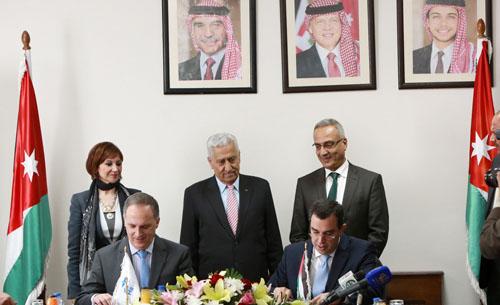You are here
E-health programme to be implemented nationwide
By Khetam Malkawi - Nov 16,2015 - Last updated at Nov 16,2015

Planning and International Cooperation Minister Imad Fakhoury and EHS Chairman Rami Farraj sign a five-year framework agreement on Monday in the presence of Prime Minister Abdullah Ensour, ICT Minister Majd Shweikeh and Health Minister Ali Hiasat (Photo courtesy Ministry of Planning and International Cooperation)
AMMAN — The government on Monday signed a five-year framework agreement with the Electronic Health Solutions Company (EHS) to regulate the implementation of the e-health programme “Hakeem” at the national level.
The agreement — signed by Planning and International Cooperation Minister Imad Fakhoury and EHS Chairman Rami Farraj — aims at coordinating cooperation between EHS — the implementing party of Hakeem programme — and the concerned health authorities in Jordan, improving healthcare services and controlling expenditures in the health sector, according to officials.
The vision behind the Hakeem programme is to create a database of patients’ medical histories across the Kingdom, including all the tests, procedures and surgeries they undergo, in addition to the diseases they suffer from, their allergies, the medications they take and other health information.
Currently, there are 10 public hospitals connected to the programme, with the figure expected to reach 17 by the end of this year. In addition, there are 33 health centres connected to the system.
Prime Minister Abdullah Ensour, who attended the signing ceremony at Prince Hamzah Hospital, described the project as one of the most important programmes implemented in the Kingdom as it is concerned with citizens’ health.
Underscoring that the health sector is considered one of the Kingdom’s major achievements, he said Jordanians deserve to receive the best medical care.
The health sector in the country, he added, is a source of pride and one of the most important resources for Jordan as thousands of patients come to the Kingdom annually for treatment.
One of the benefits of implementing the Hakeem programme, the premier noted, is that medical files of patients will be available electronically wherever they are and whenever they need them.
So far, the system’s database has the files of 1.4 million patients, according to Farraj.
He noted that next year, the plan includes automating the systems at Al Bashir Hospital and King Hussein Medical Centre.
The project, which was first implemented at Prince Hamzah Hospital, is expected to be complete by the end of 2020, Farraj said, noting that private hospitals are welcome to join the system.
Meanwhile, Fakhoury stressed the importance of implementing the programme nationwide, noting that it will help provide information on health insurance for Jordanians and identify those with coverage.
“This is very important to us as it is part of our 2025 Vision,” Fakhoury told reporters after signing the agreement.
Health Minister Ali Hiasat noted that the system will also assist scientific research conducted on the prevalence of diseases, and will help reduce medical bills as all information will be automated, even X-rays.
In order to encourage private hospitals to join the system, Hiasat noted that a draft by-law will be issued soon obliging all hospitals in Jordan to obtain national accreditation.
Joining the system will be a requirement to obtain the accreditation, according to the health minister.
There are 31 public hospitals across the Kingdom according to the Health Ministry’s website, and more than 700 health centres.
The Hakeem programme is operated by E-Health Solutions, a nonprofit company that has as stakeholders the health and ICT ministries, the Royal Medical Services, the King Hussein Cancer Centre, the Private Hospitals Association and the Royal Health Awareness Society.
Related Articles
AMMAN — The health records of over 3 million Jordanians are now accessible in any public or military health facility connected to the e-heal
AMMAN — Jordan and Algeria on Monday held talks focused on enhancing cooperation in multiple fields to follow up on the outcomes of His Maje
AMMAN — Health Minister Mahmoud Sheyyab on Wednesday said that the cost of the government’s executive plan to reform the health sector in 20

















